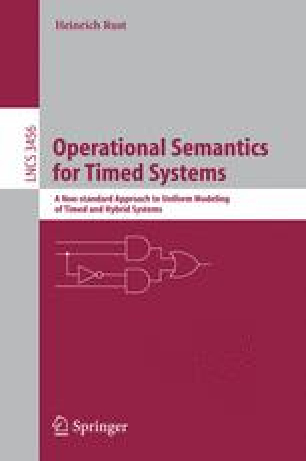
Operational Semantics for Timed Systems
Publication year: 2005
ISBN: 978-3-540-32008-1
Internet Resource: Please Login to download book
This monograph is dedicated to a novel approach for uniform modelling of timed and hybrid systems. Heinrich Rust presents a time model which allows for both the description of discrete time steps and continuous processes with a dense real-number time model. The proposed time model is well suited to express synchronicity of events in a real-number time model as well as strict causality by using uniform discrete time steps. Thus it integrates and reconciles two views of time that are commonly used separately in di?erent application domains. In many discrete systems time is modelled by discrete steps of uniform length, in continuous systems time is seen as a dense ?ow. Themainideatointegratethesedi?erentviewsisadiscretizationofthedense real-number time structure by using constant in?nitesimal time steps within each real-number point in time. The underlying mathematical structure of this time model is based on concepts of Non-standard Analysis as proposed by Abraham Robinson in the 1950s. The discrete modelling, i.e., the descr- tion of sequential discrete algorithms at di?erent abstraction levels, is done with Abstract State Machines along the formalisms developed by Yuri Gu- vich and temporal logic. These ingredients produce a rich formal basis for describing a large variety of systems with quantitative linear time prop- ties, by seamless integration, re?nement and embedding of continuous and discrete models into one uniform semantic framework called“Non-standard Timed Abstract State Machines”(NTASM).
Subject: Computer Science, abstract state machines, algorithms, continuous time systems, discrete time systems, hybrid systems, modeling, non-standard analysis, non-standard timed abstract state machines, operational semantics, temporal logics, timed Petri nets, timed automata, timed systems